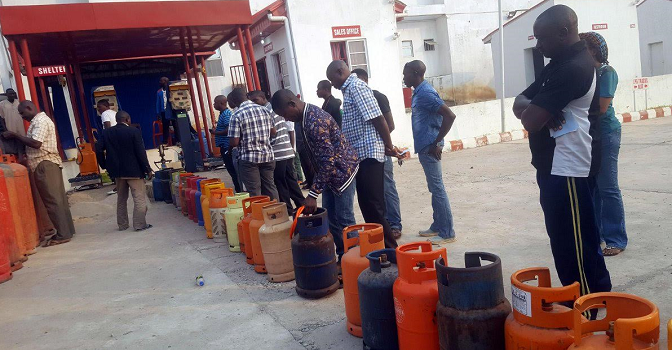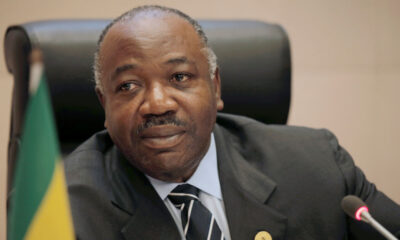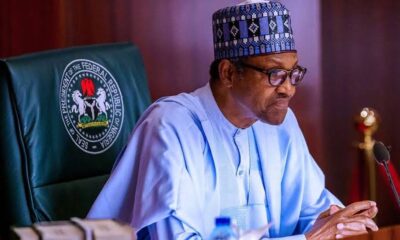Business
Nigerians Lament As Cooking Gas Price Soars

Nigerians’ 63rd independence anniversary gift was a sudden increase in the price of Liquefied Natural Gas, LNG, commonly known as cooking gas. Although most people were not in a celebratory mood following the myriad of socio-economic problems bedevilling the nation, even a few of those who wanted to celebrate the event were taken aback.
For a couple of months, the price of the essential commodity has been fluctuating, adding more pain to the lives of Nigerians, particularly the average people, who have come to the realisation that the use of LPG for cooking is safer, easier and faster than the traditional firewood or charcoal.
A 12.5kg of cooking gas, which sold for between N9000 and N10,000, depending on the point of purchase across Lagos by the end of September, suddenly rose to a staggering N12,500 at the dawn of October.
The development has become a great source of worry and concern to many Nigerians, particularly when considered against an earlier warning by the President of the Nigerian Association of Liquefied Petroleum Gas Marketers, Olatunbosun Oladapo, that the price of 12.5kg cooking gas could hit as high as N18,000 by December, if the Federal Government did not checkmate the activities of the terminal owners.
“Yes, the price is now N1,000 per kilogramme, but the government is yet to step in, despite a meeting we had with the NMDPRA,” he said.
Oladapo had lamented that gas retailers still buy 20 metric tonnes of gas for N14 million at the depot.
“We still buy a 20 MT truck at N14 million at the depots. And the price of diesel has increased so much that it now costs N1.7 million to take gas from Lagos to the North due to the high cost of diesel. If we sell here at N1, 000 per kilogramme, just imagine how much it would cost in the East and North.
“We pray for the prices to come down so that the ordinary masses can benefit from the decade of gas policy of the Federal Government, which seeks to make gas accessible and affordable for the common man,” he said.
In September, there was a story in the media of how the terminal owners had jerked up the price of cooking gas from between N9 million and N10 million per 20 metric tonnes to N14 million.
“There is a ridiculous hike in gas prices going on right now, and I am afraid that if the Federal Government does not step in to checkmate the activities of these terminal owners, the price could reach as high as N18 million for a 20 metric tonnes truck by December. This means that a 12.5kg could go as high as N18,000,” Oladapo stated.
He lamented that the terminal owners were hiding under the guise of high foreign exchange to increase price, thereby compounding the suffering of the masses,” he said.
However, Nigerians have been reacting to the development, with some people suggesting that the fallout of this ugly trend, if the government did not respond urgently, would add to the already impoverished lives of the ordinary people, and endanger the environment.
Those who hold this view have argued that when the people can no longer afford the price of cooking gas, they would fall back to the use of firewood, which automatically means that more trees would be felled for that purpose.
They also argued that wildlife would be affected as some wild animals whose habitats are thick forests would be exposed to danger of being hunted down when the trees that provide shelter to them are felled for firewood.
However, many still blame the development on the fuel subsidy removal, which, according to them, has pushed up prices of virtually everything, including the cooking gas.
While examining the issue, the former national chairman of Liquefied Petroleum Gas Retailers Association of Nigeria, Chika Umudu said he would attribute the recent upsurge in LPG price to three major factors.
One of the factors according to him is fundamental, while the other two are contemporary factors.
He attributed the fundamental factor to the government’s inability to evolve a sustainable policy for the development of the country’s gas system, especially the LPG.
“In my own opinion, what the government has been saying in the last 10 years is more rhetoric. I have said it over and over again that all the policies that have come up in this regard are phantom policies.
“As a stakeholder, I have discovered that a policy would come and you won’t see anything on ground to show that there is a commitment towards that policy.
“And sometimes, it appears that some commercial interests are imposing their business models on some people in the public sector in disguise of national interest as regards the LPG,” he said.
He also noted that the activities of marketers in the last couple of years have not helped matters.
He said: “In the last 10 years, particularly in the last eight years, a combination of some commercial marketers would affirm that they have what it takes to supply all the gas that Nigeria needs as far as LPG is concerned, and that there won’t be any kind of shortage in supply again as they have surmounted all obstacles that will impede supply.
“They would say they had developed all the infrastructure to enable Nigeria to enjoy LPG unbridled, and this false presentation was what led to the government’s proclamation of gas for all Nigerians in 2021 by former President Muhammadu Buhari, meaning that gas is now available to all Nigerians.
“As soon as that policy was officially launched in 2021, I criticised it because I didn’t see anything on the ground to show that Nigeria had come to a stage where the LPG would be readily available at affordable prices.
“Soon after, it became obvious that it was not sustainable as prices moved up from around N3000 to N10000 for 12.5kg. It was only in the middle of this year that the price came down to as low as between N5000 and N8000, only for it to start rising again and escalated in the last one month to the point that 12.5kg is sold for between N12,000 and N13000.
“It means that 1kg is sold for between N1000 and N1100, and in some places, it is up to N1200 at present.
“So, the government does not have a well articulated policy. This is because any policy should be guided by empirical studies and substance; substance of infrastructure, and capacity of the players to actually deliver. None of these is available now as far as I am concerned.
“Business interests can come and change. Any company can claim to have technology, equipment and infrastructure to provide gas for Nigerians but tomorrow their interest can change to another product. So, that is why it is essential for the government to take charge especially as it is a developing sector in Nigeria.
“Last year, we had the India-Nigeria gas summit on LPG in Abuja. I was still the national chairman then, and it was an expose on how Nigeria can actually develop an LPG policy, taking a lesson from a country that has almost the same developmental challenges like Nigeria in that sector.
“Everybody applauded what we got from the Indians who came, and the government promised to look at it and try to pattern Nigeria’s sector in that direction or even go further in knowing how other developing countries that have achieved efficiency in the sector are doing it so that we can equally marry it together with that of India but nothing has happened since then. These are the fundamental issues; the government’s inability to come up with a policy.”
He also noted that with the removal of fuel subsidy, LPG would have been an alternative energy for those who cannot afford the escalating price of fuel but regretted that even the LPG is becoming more expensive than fuel.
“And it is frustrating a lot of Nigerians because many people have come to embrace the product as a means of domestic energy. It is like leaving them in the middle of the road.
“Nigeria is becoming an urban based society. I don’t have the figure of the number of people living in the urban area or those that live in the rural area, but I know that urbanisation has tremendously grown in recent times.
“Many towns have emerged into big towns. The big towns we know have expanded beyond imagination and the people find it difficult to access other alternative fuels like charcoal and firewood.
“And even accessing firewood and other related energy by those that live in the rural areas raises a concern of environmental issues because our environment that is under threat will be exposed to further incursions, which is not good for our sustainable development planning,” he said.
He, however, lamented that the current crisis has thrown up two challenges which Nigerians may not know.
The two things, according to him, are the issue of price and availability. He stressed that the product is not available and at the same time, the price is high.
On the two contemporary issues that have also contributed to the current price rise, he said: “This present crisis is caused by the devaluation of the naira and inability of the suppliers, especially the Nigeria Liquefied Natural Gas, NLNG, at Bonny in Rivers State to meet up with local demand as well as the inability of other importers to meet up also.”
Also speaking, Chairman of the Middle Belt Forum, MBF, Dr. Pogu Birtus decried the astronomical rise in the price of cooking gas, describing it as an unfortunate development.
He lamented that cooking gas which ordinarily should have eased the burden on the cost of fuel or energy generally, following the removal of subsidy on petrol, is gradually getting beyond the reach of an average Nigerian.
“Instead of maintaining and stabilising the price of cooking gas, which Nigerians have seen as a solace to the fuel subsidy removal, the government has allowed its price to skyrocket to the point where ordinary Nigerians cannot afford it; it is unfortunate,” he said.
He, therefore, called on the economic team of President Tinubu to have a rethink on the ways of addressing the issues, saying, “Too much of taxation kills the economy and it is affecting the poor and the middle class earners more than anybody else.
“And you see, when we talk of pensioners, and civil servants, they only constitute about one percent of the population of Nigeria. So, what happens to other Nigerians who are not earning anything, or who have not worked before and have to be living on their farms and other menial jobs to survive?”
He is among those who have warned that if an urgent step is not taken by the government to address the high cost of cooking gas, it would force the people to use firewood and charcoal, which will also, in the long run, affect the forest.
He said: “Cooking gas should have been sold at a very low price. In fact, if there is to be a subsidy, it should be on cooking gas, so that it will solve the problem of deforestation.
Atiku Gives New Reason Tinubu Has Held Only One Cabinet Meeting Since Inauguration
“Just move around the country and look at the volume of firewood and charcoal that are being sold. It is unnecessary. We are killing and destroying our forest because the cost of cooking gas is too high.
“Nigeria should actually subsidise the cooking gas. Let the price be as low as possible so that people will stop hacking our trees, creating deforestation and generating desertification, and killing a lot of things, including the fauna. It is not just the plant but even the animals are also endangered when the forests are attacked.
“That will also mean that we will be losing our forests more and more; leading to deforestation. This will, invariably, affect the whole ecosystem. The wild animals will find no place to rest, desertification will increase, and so many other backlashes will come to play. And of course, when the hardship becomes so unbearable for the people having been pushed to the wall, they will fight back.
“So, it is in the interest of the government to make the price of cooking gas cheap, so that people would not want to resort to buying firewood or buying wood for charcoal.”
But for the president of Arewa Youth Consultative Forum, Alhaji Yerima Shettima, it is inflation in the country that is affecting the price of everything, including cooking gas.
“Once there is inflation as we have it in the land today, you expect that the price of everything will go up. So, it is not only the price of cooking gas that has gone up; it is a general problem because so many other things are not normal. It is a trying period and all hands must be on deck to address the problem,” he said.
He lamented that the poor masses have been at the receiving end of it, but warned that the government must avoid incurring the wrath of the masses by responding urgently and adequately to the problem.
“The government must look into it thoroughly and what it has become because the moment an average man cannot cook in his house, since even the gas, not only the raw food has now become a problem, then, you are likely to have the people revolt along the line.
“So, the government must look inward, come up with policies that will review the problem and address it as soon as possible. And this must be considered as a short-term solution because people cannot contain it.
“People cannot continue managing it the way it is going. So, the government must come up with something better as soon as possible,” he said.
But, for a visiting professor at Usman Dan Fodio University and Deputy Director, Neurotrauma Centre, Nnamdi Azikiwe University, Dr Tony Ugwu, the continuous rise in the price of cooking gas may not be entirely blamed on inflation as some other people have argued.
He believes that even though the LPG is produced in Nigeria, the production profile is not enough for the teeming population of Nigerians who scramble for the product.
He also drew attention to the fact that Nigerians now use it to run their generators, following the removal of subsidy on petrol.
He said: “The fact that the cost of cooking gas is rising and is almost hitting the rooftop should not be a surprise to discerning Nigerians.
“This is because most Nigerians no longer use it to cook; they now use it as an alternative to fuel to operate generators following the government’s removal of fuel subsidy. So, that is a contributory factor to the continuous rise in its price,” he said.
He also warned that the fallout of the continuous rise is that people will resort to the local method of cooking- the use of firewood and charcoal.
“And that is what people are doing currently. If you check, it is already affecting the prices of firewood and charcoal and that will also be disastrous.
“So, the government just has to do something very urgent to arrest the rising cost to avoid people’s revolution, which ostensibly could be the end result if nothing is done to address the trend,” he cautioned.
(Daily Post)
Send Us A Press Statement Advertise With Us Contact Us
And For More Nigerian News Visit GWG.NG














